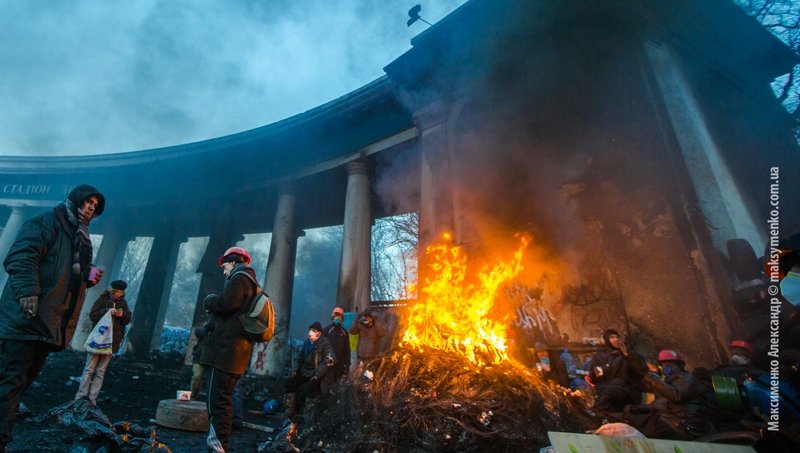Moscow Fiddles, While Kiev Burns
"The prestige of hosting the Olympics — and the huge international spotlight that accompanies the spectacle — limits Moscow’s ability to act decisively toward Ukraine as it might have otherwise," writes Will Pomeranz.

Timing is everything in politics, and this adage could not be truer for the whirlwind now enveloping Russia and Ukraine. Both countries are in the headlines — Russia for the coming $50 billion Winter Olympics extravaganza, and Ukraine for an economic and political collapse that has left the country on the cusp of revolution.
The confluence of these two events has created a unique set of circumstances unlikely to change until the Olympic flame is extinguished on February 23. For the prestige of hosting the Olympics — and the huge international spotlight that accompanies the spectacle — limits Moscow’s ability to act decisively toward Ukraine as it might have otherwise.
This unexpected inaction can be traced to a failure of Russian soft power and a large segment of the Ukrainian population’s unwillingness to be bought off.
Russia could still resort to tougher measures, including trade boycotts, energy cutoffs, even direct aid to the Ukrainian security services. But Moscow has chosen not to so far — in large part because the consequences of such actions are incendiary. If Russia were to intervene — and fail — its new status as a re-emerging power would be severely damaged.
The Ukrainian crisis seemingly turned in Russia’s favor only recently. Ukraine is broke, and President Victor Yanukovich used the debate over signing the European Union association agreement to solicit proposals for a possible bailout. Not surprisingly, there were not many bidders. Russia ultimately won with a relatively modest offer of $15 billion in loans and a reduction in energy prices.
Yet rather than quietly cementing Kiev’s dependency on Moscow, Russia’s rescue package provoked a popular outcry across Ukraine. A significant portion of Ukrainians see their future tied to Europe — a transition that will require major short-term sacrifices for potential long-term social and economic gains.
Ukraine remains too poor and unstable to expect rapid entry into the European Union. But at least its people can dream of someday reaching this rule-of-law oasis. For them, reliance on Russia just means more of the status quo: corruption, economic decline and political repression.
So Russia’s loan failed to end the stalemate on the streets of Kiev. The crisis moved to a new level with Yanukovich’s cowardly decision to rush through legislation clamping down on all forms of political protest and dissent.
The crucial political middle has seemingly disappeared; as opposition leader Arseniy Yatsenyuk exclaimed, he would rather take a bullet to the head than seek a compromise on Yanukovich’s terms. Additional offers of truce and a government shake-up have been roundly rejected by the opposition.
The Kremlin is, no doubt, working behind the scenes to protect its interests in Ukraine. But publicly, it can only grimly watch as events spin out of control. Without Ukraine, a huge part of Russia’s foreign policy ambitions — an integrated Eurasian economic union — falls by the wayside.
The Kremlin is also concerned that a Ukraine-oriented toward Europe will damage Russia’s economic prospects. Russia is already the most protectionist country in the world, and new barriers invariably would have to be erected if Ukraine signs a free-trade agreement with the European Union and becomes a conduit for cheaper European goods into Russia.
Yet despite the critical importance of Ukraine, Russia’s response over the past few weeks has been muted. Foreign Minister Sergei Lavrov has soft-pedaled a standard complaint of foreign interference in Ukraine’s domestic affairs.
Such restraint is out of character for Russia — especially when its national interests are so directly in play. Historically, the Russian Empire and then the Soviet Union were not afraid to intervene militarily in such circumstances to support local allies. Russia also has not shied away from interceding in post-Soviet conflicts, most notably in the 2008 crisis with Georgia.
The Kremlin must now recognize, however, that any overt action in Ukraine would further politicize the Olympics, overwhelming any positive message that Russia is trying to communicate by hosting the games.
In addition, all Moscow’s security apparatus is now likely geared toward one goal: making sure that there are no acts of terrorism or other security breaches at Sochi. Otherwise, no matter what happens on the ice or the slopes, Russia’s Olympic memories will be tarnished. It would never be able to recoup its $50 billion investment in Sochi as the next great tourist destination.
So, for the next four weeks anyway, Russia must weigh the opportunity costs for any deeper public engagement in the Ukrainian crisis.
Rumors abound as to what Russia is doing secretly in Ukraine. But whatever discord Moscow is trying to sow, developments on the ground are not moving in the Kremlin’s direction. The Ukrainian prime minister and government have resigned. Yanukovich’s poll numbers are plummeting, and his ability to bring decisive force into play seems increasingly in doubt. So many cities are now in open confrontation that, without outside help, Yanukovich may not possess sufficient authority to lead any post-crisis government.
Moscow must also be concerned about its financial commitment to Ukraine, which remains in economic freefall. Moscow supposedly has deep pockets, but every ruble spent in Ukraine is another ruble that can’t be used to support Russia’s own fragile economy. So there may be limits to Russia’s largesse. Putin, in fact, has now delayed $2 billion of the promised loan payments until a new government is formed.
A month is a lifetime in any revolutionary situation. The relative fortunes of the players involved can literally change overnight. Yanukovich, in particular, has so backed himself into a corner that he may try anything to stay in power.
But victory also can be ephemeral — as Egypt’s “winners” of Tahrir Square have so tragically learned. The Ukrainian opposition will have to act quickly to consolidate any successes that it might gain in the streets of Kiev.
Yet, with this strange twist of timing, Russia’s attention is divided at the exact moment that Ukraine’s future is at stake. But events in Ukraine will not pause while the rest of the world plays games by the Black Sea. Russia’s dream of hosting the Olympics ironically may come at the cost of its longstanding regional aspirations.
About the Author

William E. Pomeranz
William Pomeranz, the Director of the Wilson Center’s Kennan Institute, is an expert guide to the complexities of political and economic developments in Russia, particularly through the lens of law. He leverages extensive, hands-on experience in international and Russian jurisprudence to address a wide range of legal issues, from the development of Russia’s Constitution to human rights law to foreign investment and sanctions. He is also the author of Law and the Russian State: Russia's Legal Evolution from Peter the Great to Vladimir Putin (Bloomsbury, 2018).
Read More
Kennan Institute
The Kennan Institute is the premier US center for advanced research on Russia and Eurasia and the oldest and largest regional program at the Woodrow Wilson International Center for Scholars. The Kennan Institute is committed to improving American understanding of Russia, Ukraine, Central Asia, the Caucasus, and the surrounding region though research and exchange. Read more










